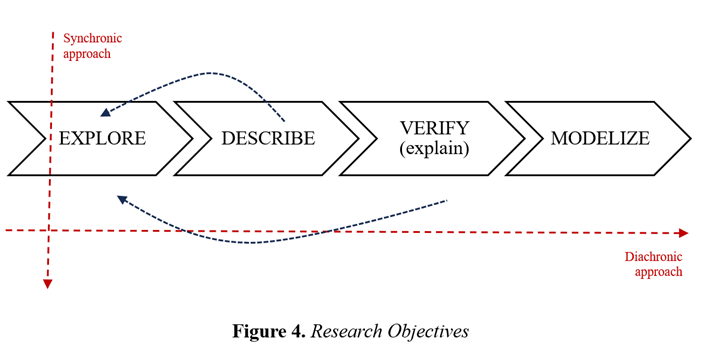Information

Constructing a theory entail utilizing inductive reasoning to create a theory grounded in observations and account for various phenomena. Conversely, the theory-testing method commences with a theory that directs the selection of which observations to conduct, progressing from the general to the specific. The theory's accuracy is assessed through observations, utilizing deductive reasoning to deduce a set of propositions from it (Fig. 3).

The selection of inductive or deductive approaches depends on the research objectives: exploration, description, verification (explanation), and modelling. These approaches can be taken separately (diachronically) or together (synchronically) to perform distinct yet complementary functions throughout the research process. Figure 4. shows that research objectives can be single or multiple and can be covered synchronously or diachronically (from the 1st to the 4th).
The exploratory (inductive) approach is useful when the research investigation aims to garner comprehensive and generic indications about the Problem, potential decision alternatives, and relevant variables that must be considered for descriptive and verification studies/phases. On the other hand, the deductive approach is instrumental in causal studies, where the objective is to demonstrate that a variable influences or determines the values of other variables, allowing researchers to test the explanations proposed by the set of hypotheses formulated.
While descriptive studies provide an objective "fixation" of some relevant aspect that may be useful in the subsequent interpretation of the results, they do not allow us to explain or anticipate the dynamics of any phenomenon, which warrants a more complex approach. Similarly, verification (explanatory) studies become imperative when it is essential to demonstrate that a variable has a causal impact on other variables.
Finally, modelling objectives are achieved when the theory underlying the structure of hypotheses is sustainable in light of the results, leading to a more complex and valuable level of Knowledge. Such investigations make a sensitive contribution to the body of Knowledge they are part of, to the extent that they now have a forecasting and management tool.
In summary, while the exploration phase identifies all potential reasons for a problem, the study's descriptive and explanatory phases aim to estimate its possible causes.
